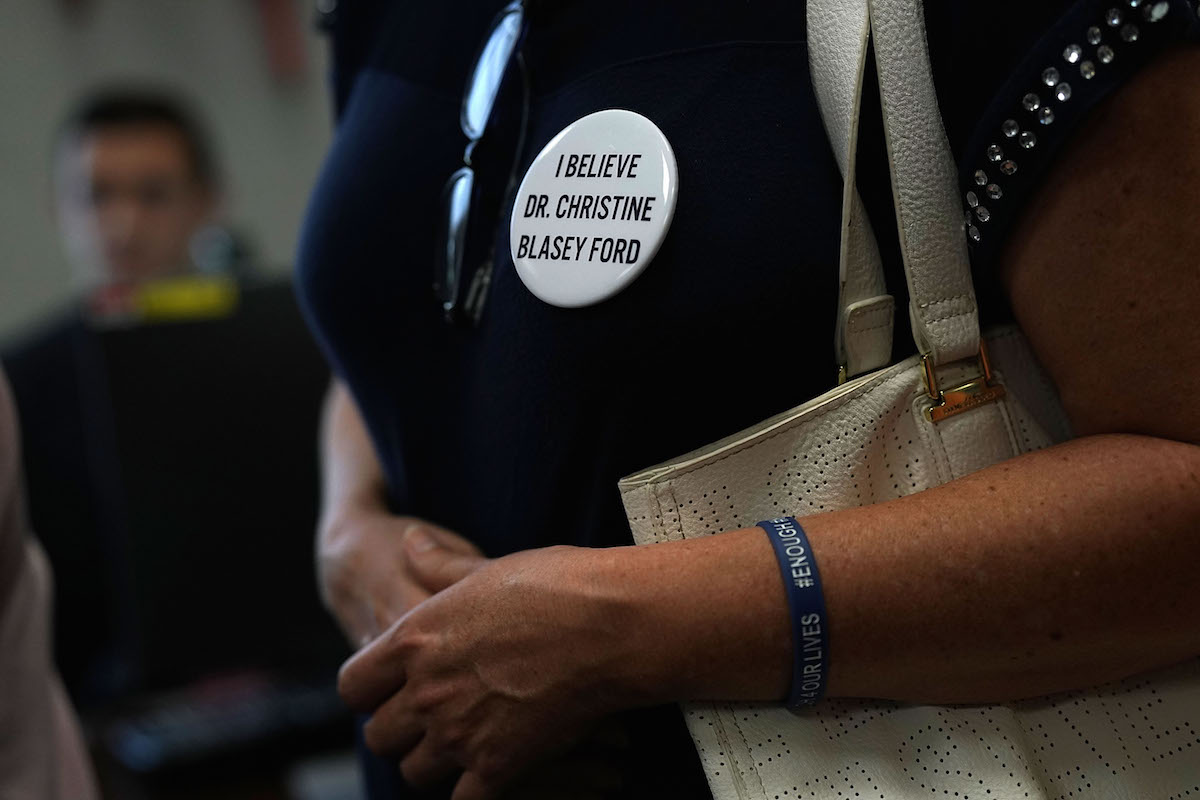Kavanaugh & His Supporters Keep Calling for “Fairness.” What Do They Think They’re Getting Now?


Last night, Brett Kavanaugh and his wife Ashley appeared on Fox News in an interview with Martha MacCullum–who, as a relevant side note, was one of Roger Ailes’ staunchest defenders after Gretchen Carlson accused the network head of sexual harassment.
It was an awkward half-hour, with an uncomfortable-looking Kavanaugh repeatedly touching on what seemed to be over-rehearsed talking points. Most notably, in the short interview, he called for “fairness” and a “fair process” approximately twenty times. Donald Trump, too, has repeatedly called into question the “fairness” of the current process. He tweeted that the judge and his family must be treated fairly, implying that they currently aren’t, and he told reporters that “this could be one of the single most unfair, unjust things to happen for a candidate for anything.”
What would fairness in these proceedings look like to Trump, Kavanaugh, and their supporters? Because I agree with them both that so far, the process has not been fair, and it doesn’t look to get any fairer in the days ahead. But it’s not Kavanaugh that’s suffering from the inequity.
If this were a fair process, Dr. Blasey Ford wouldn’t have been shamed for not being prepared to testify in a congressional hearing–an intimidating, high-pressure environment requiring more preparation and resources than are available to most laypeople–with only 48 hours notice.
If it were fair, senators and the president wouldn’t be stating publicly that they’d already made up their minds in Kavanaugh’s favor. Sure, there are a lot of protestors calling for Kavanaugh to withdraw or not be appointed, but protestors only have so much sway over their elected officials. Those who have the power to make this decision, those in the majority party, are not acting with fairness.
Fairness would mean people wouldn’t be dismissing the accusations against Kavanaugh as the drunken antics of a teenage boy, while shaming Deborah Ramirez for having been drinking at the same party.
It would mean Kavanaugh couldn’t use his image of a “good” and “decent” man as his main defense. Sure, 65 women signed a letter saying he never assaulted them. He’s hired women and coached a girls’ basketball team. None of that precludes him from having committed the abuses he’s been accused of. If this were a fair process, the committee would focus on facts. Or, at the very least, they’d give equal weight to the women’s reputations. After all, 200 alumni from Dr. Ford’s alma mater signed a letter supporting her and defending her character. Doesn’t that count for anything? Wouldn’t that be fair?
(Kavanaugh also said in the interview that he was a virgin in high school and the years following, as if that proves he couldn’t have done the things he was accused of, though none of the accusations against him have anything to do with virginity and everything to do with disrespect towards women and establishing physical and emotional power over them.)
Fairness would also mean we’d have to consider all of Kavanaugh’s words, not just the ones where he says he’s a great guy. Here’s how he described himself in the Fox News interview:
The vast majority of the time I spent in high school was studying or focused on sports and being a good friend to the boys and the girls that I was friends with. I went to an all-boys Catholic high school where I was focused on academics and athletics, going to church every Sunday, working on my service projects, and friendship, friendship with my fellow classmates and friendship with girls from the local all-girls Catholic schools. I’ve always treated women with dignity and respect.
But his own words in his high school yearbook contradict that depiction of himself. In that yearbook, he and number of his football teammates boasted of having sex with one of the women who signed that letter of support. (They labeled themselves “Renate alumni,” referencing unsubstantiated sexual encounters with the woman, named Renate, who said she was not aware of the “hurtful” yearbook claims when she signed the letter.)
In college, he was a member of a fraternity known for engaging in behaviors that “demean women,” as a letter published in Yale’s newspaper stated. He was also part of an all-male secret society known as “Tit and Clit” which was shut down for a number of years after videos surfaced that showed members chanting “No means yes, yes means anal” in front of the campus’ Women’s Center. If we’re taking Kavanaugh at his word, shouldn’t we take those words into consideration?
There are a lot of things that can be done to make sure this is a fair process, but at this point, none of them involves going easier on Kavanaugh. He’s doing just fine.
(image: Alex Wong/Getty Images)
Want more stories like this? Become a subscriber and support the site!
—The Mary Sue has a strict comment policy that forbids, but is not limited to, personal insults toward anyone, hate speech, and trolling.—
Have a tip we should know? [email protected]
